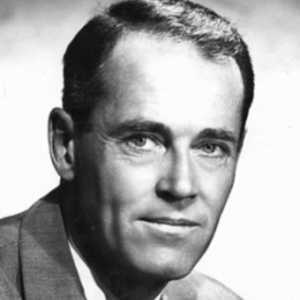Henry Jaynes Fonda (May 16, 1905 – August 12, 1982) was an American actor. He had a career that spanned five decades on Broadway and in Hollywood. He cultivated an everyman screen image in several films considered to be classics.
Born and raised in Nebraska, Fonda made his mark early as a Broadway actor and made his Hollywood film debut in 1935. He rose to film stardom with performances in films like Jezebel (1938), Jesse James (1939), and Young Mr. Lincoln (1939). His career further progressed with his portrayal of Tom Joad in The Grapes of Wrath (1940), receiving a nomination for the Academy Award for Best Actor.
In 1941, Fonda starred opposite Barbara Stanwyck in the screwball comedy classic The Lady Eve. Book-ending his service in WWII were his starring roles in two highly regarded Westerns: The Ox-Bow Incident (1943) and My Darling Clementine (1946), the latter directed by John Ford, and he also starred in Ford's Western Fort Apache (1948). After a seven-year break from films, during which Fonda focused on stage productions, he returned with the WWII war-boat ensemble Mister Roberts (1955). In 1956, at the age of fifty-one, he played the title role as the thirty-eight-year-old Manny Balestrero in Alfred Hitchcock's thriller The Wrong Man. In 1957, he starred as Juror 8, the hold-out juror, in 12 Angry Men. Fonda, who was also the co-producer of this film, won the BAFTA award for Best Foreign Actor.
Later in his career, Fonda moved into darker roles, such as the villain in the epic Once Upon a Time in the West (1968), a box office success in Europe, now regarded as one of the best Westerns of all time. He also played in lighter-hearted fare such as Yours, Mine and Ours with Lucille Ball and My Name is Nobody with Terence Hill, but also often played important military figures, such as a colonel in Battle of the Bulge (1965), and Admiral Nimitz in Midway (1976). He won the Academy Award for Best Actor at the 54th Academy Awards for his final film role in On Golden Pond (1981), which also starred Katharine Hepburn and his daughter Jane Fonda, but was too ill to attend the ceremony. He died from heart disease a few months later.
Fonda was the patriarch of a family of actors, including daughter Jane Fonda, son Peter Fonda, granddaughter Bridget Fonda, and grandson Troy Garity. In 1999 he was named the sixth-Greatest Male Screen Legends of the Classic Hollywood Era (stars with a film debut by 1950) by the American Film Institute.
Family history and early life
Jane Fonda, Henry Fonda, and Peter Fonda in the 1950s
Born in Grand Island, Nebraska, on May 16, 1905, Henry Jaynes Fonda was the son of printer William Brace Fonda, and his wife, Herberta (Jaynes). The family moved to Omaha, Nebraska, in 1906.
Fonda's patriline originates with an ancestor from Genoa, Italy, who migrated to the Netherlands in the 15th century. In 1642, a branch of the Fonda family immigrated to the Dutch colony of New Netherland on the East Coast of North America. They were among the first Dutch population to settle in what is now upstate New York, establishing the town of Fonda, New York. By 1888, many of their descendants had relocated to Nebraska.
Fonda was brought up as a Christian Scientist, though he was baptized an Episcopalian at St. Stephen's Episcopal Church in Grand Island. They were a close family and highly supportive, especially in health matters, as they avoided doctors due to their religion. Despite having a religious background, he later became an agnostic. Fonda was a bashful, short boy who tended to avoid girls, except his sisters, and was a good skater, swimmer, and runner. He worked part-time in his father's print plant and imagined a possible career as a journalist. Later, he worked after school for the phone company. He also enjoyed drawing. Fonda was active in the Boy Scouts of America; Teichmann reports that he reached the rank of Eagle Scout. However, this is denied elsewhere. When he was 14, he and his father witnessed the brutal lynching of Will Brown from a nearby building during the Omaha race riot of 1919. This enraged the young Fonda and he kept a keen awareness of prejudice for the rest of his life. Remarking on the incident in a 1975 BBC interview, he said: "It was the most horrendous sight I'd ever seen. My hands were wet, there were tears in my eyes. All I could think of was that young black man dangling at the end of a rope." By his senior year in high school, Fonda had grown to more than six feet (1.8m) tall, but remained shy. He attended the University of Minnesota, where he majored in journalism, but did not graduate. While at Minnesota he was a member of Chi Delta Xi, a local fraternity, which later became Chi Phi's Gamma Delta chapter on that campus. He took a job with the Retail Credit Company.
